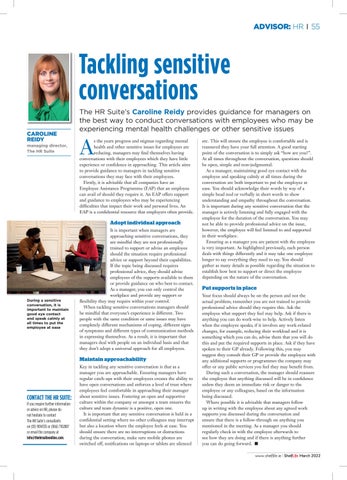ADVISOR: HR
55
Tackling sensitive conversations CAROLINE REIDY managing director, The HR Suite
The HR Suite’s Caroline Reidy provides guidance for managers on the best way to conduct conversations with employees who may be experiencing mental health challenges or other sensitive issues
A
s the years progress and stigmas regarding mental health and other sensitive issues for employees are reducing, managers may find themselves having conversations with their employees which they have little experience or confidence in approaching. This article aims to provide guidance to managers in tackling sensitive conversations they may face with their employees. Firstly, it is advisable that all companies have an Employee Assistance Programme (EAP) that an employee can avail of should they require it. An EAP offers support and guidance to employees who may be experiencing difficulties that impact their work and personal lives. An EAP is a confidential resource that employers often provide.
Adopt individual approach
During a sensitive conversation, it is important to maintain good eye contact and speak calmly at all times to put the employee at ease
It is important when managers are approaching sensitive conversations, they are mindful they are not professionally trained to support or advise an employee should the situation require professional advice or support beyond their capabilities. If the topic being discussed requires professional advice, they should advise employees of the supports available to them or provide guidance on who best to contact. As a manager, you can only control the workplace and provide any support or flexibility they may require within your control. When tackling sensitive conversations managers should be mindful that everyone’s experience is different. Two people with the same condition or same issues may have completely different mechanisms of coping, different signs of symptoms and different types of communication methods in expressing themselves. As a result, it is important that managers deal with people on an individual basis and that they don’t adopt a universal approach for all employees.
Maintain approachability
CONTACT THE HR SUITE: If you require further information or advice on HR, please do not hesitate to contact The HR Suite’s consultants on (01) 9014335 or (066) 7102887 or email the company at info@thehrsuiteonline.com.
Key in tackling any sensitive conversation is that as a manager you are approachable. Ensuring managers have regular catch-ups with their employees creates the ability to have open conversations and enforces a level of trust where employees feel comfortable in approaching their manager about sensitive issues. Fostering an open and supportive culture within the company or amongst a team ensures the culture and team dynamic is a positive, open one. It is important that any sensitive conversation is held in a confidential setting where no other colleagues may interrupt but also a location where the employee feels at ease. You should ensure there are no interruptions or distractions during the conversation, make sure mobile phones are switched off, notifications on laptops or tablets are silenced
etc. This will ensure the employee is comfortable and is reassured they have your full attention. A good starting point of the conversation is to simply ask “how are you?”. At all times throughout the conversation, questions should be open, simple and non-judgmental. As a manager, maintaining good eye contact with the employee and speaking calmly at all times during the conversation are both important to put the employee at ease. You should acknowledge their words by way of a simple head nod or verbally in short words to show understanding and empathy throughout the conversation. It is important during any sensitive conversation that the manager is actively listening and fully engaged with the employee for the duration of the conversation. You may not be able to provide professional advice on the issue, however, the employee will feel listened to and supported in their workplace. Ensuring as a manager you are patient with the employee is very important. As highlighted previously, each person deals with things differently and it may take one employee longer to say everything they need to say. You should gather as many details as possible regarding the situation to establish how best to support or direct the employee depending on the nature of the conversation.
Put supports in place Your focus should always be on the person and not the actual problem; remember you are not trained to provide professional advice should they require this. Ask the employee what support they feel may help. Ask if there is anything you can do work-wise to help. Actively listen when the employee speaks; if it involves any work-related changes, for example, reducing their workload and it is something which you can do, advise them that you will do this and put the required supports in place. Ask if they have spoken to their GP already. Following this, you may suggest they consult their GP or provide the employee with any additional supports or programmes the company may offer or any public services you feel they may benefit from. During such a conversation, the manager should reassure the employee that anything discussed will be in confidence unless they deem an immediate risk or danger to the employee or any colleagues, based on the information being discussed. Where possible it is advisable that managers follow up in writing with the employee about any agreed work supports you discussed during the conversation and ensure that there is a follow-through on anything you mentioned in the meeting. As a manager you should regularly check in with the employee afterwards to see how they are doing and if there is anything further you can do going forward. ■ www.shelflife.ie | ShelfLife March 2022













